Watch CBS News
Be the first to know
Get browser notifications for breaking news, live events, and exclusive reporting.
Watch CBS News
Be the first to know
Get browser notifications for breaking news, live events, and exclusive reporting.
The gang leader who has become the face of Haiti’s descent into lawlessness and violence has said he would consider calling a ceasefire only if his consortium of armed gangs was included in international talks on the country’s future.
Jimmy Chérizier, the former police officer better known via his nomme de guerre “Barbecue,” spoke to Stuart Ramsay, the chief correspondent for the U.K.’s Sky News, which like NBC News is owned by Comcast.
He warned that a foreign peacekeeping force would be treated as enemy fighters and meet armed resistance, and that a recent pause in violence was merely a technical halt.
“There is nothing calm, but when you’re fighting you have to know when to advance and when to retreat,” Chérizier said in the interview, which aired Friday.
“I think every day that passes we are coming up with a new strategy so we can advance, but there’s nothing calm. In the days that are coming things will get worse than they are now,” he said.
Chérizier leads the G9 collective of gangs but also leads Viv Ansanm, meaning “Living Together,” a revolutionary gang alliance.
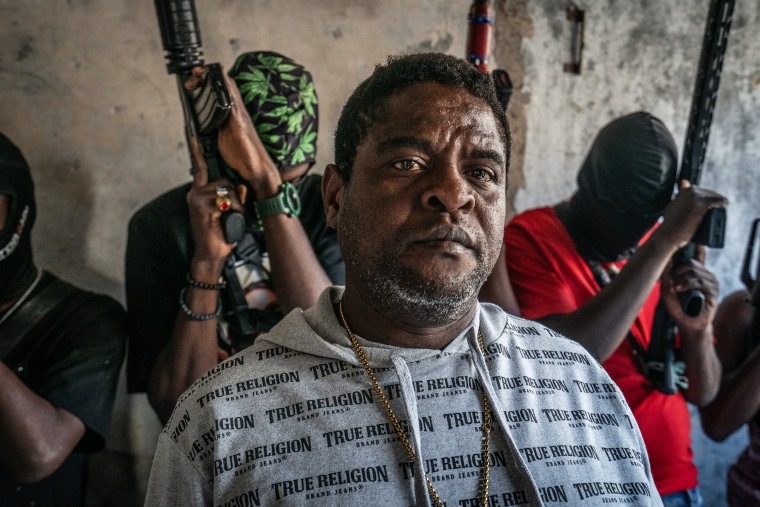
As much of 80% of the capital, Port-au-Prince, is now in the control of gangs after Prime Minister Ariel Henry announced he would stand down on March 12 following months of unrest. The United Nations said an estimated 1,500 people have been killed in gang violence this year so far, and 4,500 last year, in a report released Thursday.
At least 450 U.S. nationals have been evacuated from Haiti since March 17, with efforts ongoing to airlift the remaining Americans there, the State Department said in a briefing Thursday.
The pan-Caribbean CARICOM group of nations and the United States pledged to help form a transitional government leading to a democratic nation — but for now the gangs still rule the streets.
Chérizier was dismissive of this process, but said he respected CARICOM and left open the possibility of taking part in a peace deal.
“If the international community comes with a detailed plan where we can sit together and talk, but they do not impose on us what we should decide, I think that the weapons could be lowered,” he said.
“We don’t believe in killing people and massacring people, we believe in dialogue, we have weapons in our hand and it’s with the weapons that we must liberate this country,” Chérizier added.
The consortium of armed gangs Chérizier leads says that Haiti has been controlled by corrupt politicians, dating back at least to the devastating earthquake in 2010 that killed about 220,000 people and left 1.5 million homeless. Many in Haiti believe that international aid money for reconstruction was mishandled.
Seen by some as a revolutionary leader, Chreizier has been accused of brutal violence for years, including the killing of at least 71 civilians and torching of some 400 homes in Port-au-Prince in 2018. That was at the time Haiti’s worst massacre in a decade and led to him being branded a human rights abuser by the U.S. Treasury.
Sky News had to travel along a deserted freeway with abandoned, burnt-out vehicles to reach the man known as Barbecue, who was surrounded by armed guards and carrying two weapons himself.
“We were told that their snipers were watching us, and to drive slowly, and follow our guide’s every move,” Ramsay wrote in his report. He described this once busy route into the capital as “a barricaded battlefield.”
The area claimed by Chérizier’s group was relatively calm and stable — food and water distribution is taking place, with orderly lines of people, he said.
But Chérizier made it clear that any foreign peacekeeping force sent in would face armed resistance.
Kenya has pledged to send 1,000 troops to coordinate a U.N.-backed alliance, but the plan is now on hold. Chérizier said the Kenyans would commit atrocities and he would not allow it.
“It’s evolving. If the Kenyan military or Kenyan police come, whatever, I will consider them as aggressors, we will consider them as invaders, and we do not have to collaborate with any invaders that have come to walk over our independence,” he said.
Chérizier predicted there would be a Haiti “where there are no kidnappings, without raping and killing people,” but this would require “corrupt politicians and the corrupt oligarchs” leaving.
A report published Thursday on the situation in Haiti, which is facing intense gang violence, by the United Nations High Commissioner for Human Rights found that sexual violence there is “severely underreported.”
The report said that according to the U.N. Office of the United Nations High Commissioner for Human Rights (OHCHR), gangs in the Caribbean country have used “sexual violence to spread fear, subjugate and punish the population.”
“Sexual violence remains severely underreported due to community stigma, the salient threat of retaliation by perpetrators, insufficiency of healthcare and psychosocial services for survivors, and lack of trust in the justice system,” the report reads. ‘Even when such incidents are reported, impunity for sexual violence is widespread.”
In a press release, the OHCHR also referred to sexual violence in Haiti as “largely unpunished.”
The report stated that OHCHR registered the deaths of at least 4,451 people in Haiti in 2023 due to gang violence, with 3,801 of them being men, 538 of them being women and 112 of them being children. Between early January and late February of this year, 686 people “not involved in the violent exchanges taking place” were killed, according to the report.
“Tackling insecurity must be a top priority to protect the population and prevent further human suffering. It is equally important to protect institutions essential to the rule of law, which have been attacked to their very core,” U.N. High Commissioner for Human Rights Volker Türk said in the press release.
Haiti’s prime minister, Ariel Henry, announced that he will resign from his position earlier this month as gang violence has raged in the country.
“The government that I’m running cannot remain insensitive in front of this situation. There is no sacrifice that is too big for our country,” Henry said in a statement on video, according to The Associated Press. “The government I’m running will remove itself immediately after the installation of the council.”
For the latest news, weather, sports, and streaming video, head to The Hill.
Watch CBS News
Be the first to know
Get browser notifications for breaking news, live events, and exclusive reporting.
DAJABÓN, Dominican Republic — Kelvin Vensy sits for hours on end on a metal barricade that separates Haiti from the Dominican Republic, holding on to a cardboard box with wax candles.
“Two candles for 15 pesos,” Kelvin, 13, shouts in creole over and over, as people rush by.
Kelvin said he takes every cent he makes to his single mother in the border town of Ouanaminthe in Haiti. She and Kelvin’s 10-year-old brother and 14-year-old sister are also street vendors.
“I try to go to school Monday through Thursday,” he said. On Fridays, he works all day at the market.
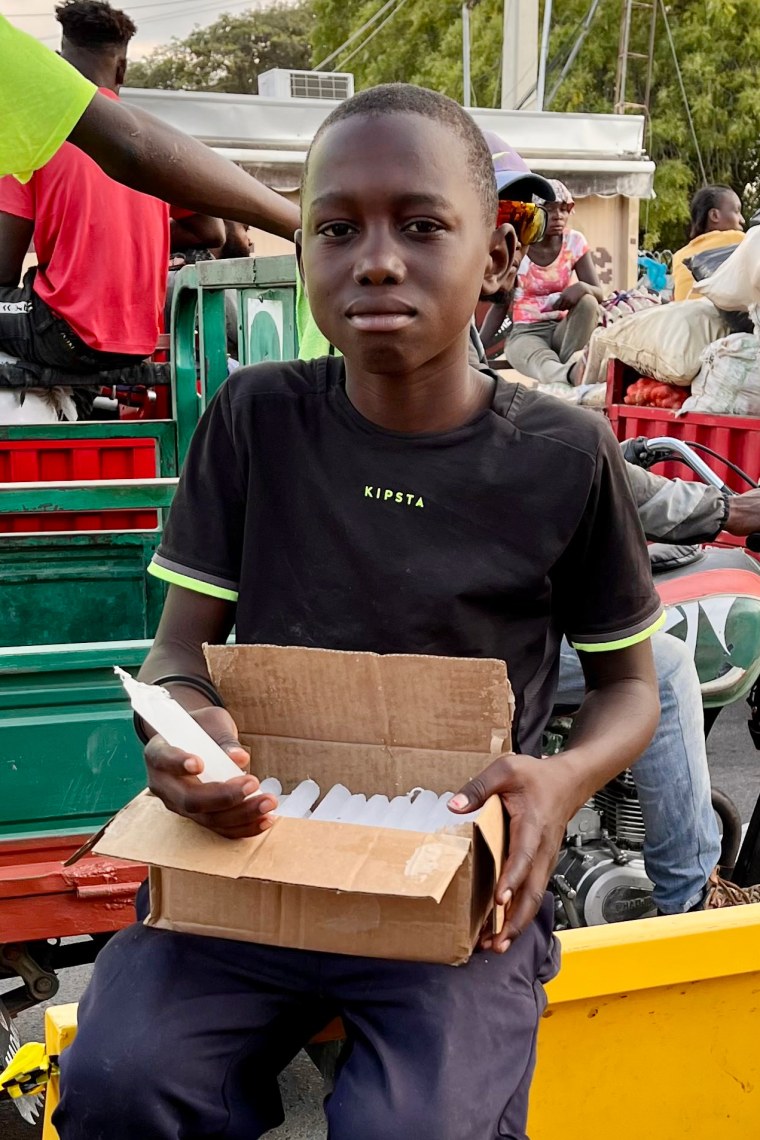
The 13-year-old is one of many Haitian children working in this binational marketplace, selling items in order to support their families. Last year, before the violence escalated, UNICEF estimated that 4 million children needed humanitarian assistance in Haiti.
Between family needs and minimal safety to attend schools throughout Port-au-Prince, many parents are scrambling to ensure that their children not only stay out of direct harm, but also continue their education amid the ongoing strife caused by violent groups.
More than 500,000 children had lost access to education as of 2022, UNICEF said last year. Nearly 1,700 schools have been closed in Port-au-Prince since gang violence increased in April 2022, according to the Ministry of National Education and Vocational Training.
“No child can go to school while bullets are flying in the air, it is dangerous and it should not be,” said Bruno Maes, a UNICEF representative in Haiti. Some schools have turned into shelters for the 377,000 people estimated to have been displaced across the country in recent years, including 15,000 more displaced since February.
Danielle Nesly, 41, and her husband, Pierre Nesly, 47, said they and their two daughters left their home in Port-au-Prince for the northern part of the country, in Cap-Haitien. But the fear of gang violence spreading and the deterioration of the country’s economy prompted them to flee to the Dominican Republic.
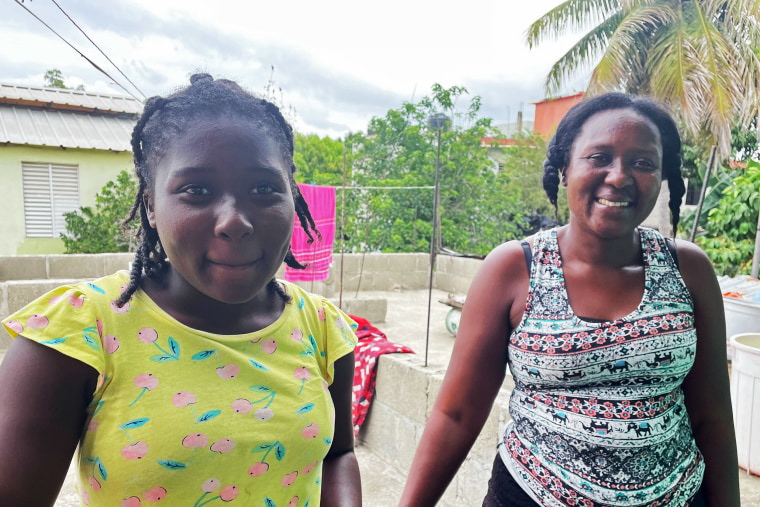
It took them two years to get work permits and the required documents to get the children in school. The girls are now 14 and 5. They speak creole at home but are learning Spanish and trying to fit in.
“It was too difficult living there,” Danielle said. “This is still difficult, but better.”
In an effort to control gang violence, the 7 p.m. to 6 a.m. curfew in Port-au-Prince has been extended until Tuesday March 26. Haitian Finance Minister Michel Patricio Boisvert announced said the extension of the curfew has the goal of “re-establishing order and taking measures to control the situation.”
Boisvert has been acting as the highest government official in Haiti since gangs prevented Prime Minister Ariel Henry from landing in Port-au-Prince after a February trip to Kenya.
PORT-AU-PRINCE — Almost half of Haiti’s people are struggling to feed themselves as gang violence spreads across the country, with several areas close to famine, international organizations said on Friday.
Inflation and poor harvests have also helped push Haiti to its worst levels of food insecurity on record, they said.
“Rising hunger is fueling the security crisis that is shattering the country. We need urgent action now — waiting to respond at scale is not an option,” Jean-Martin Bauer, the World Food Programme’s Haiti director, said.
The Integrated Food Security Phase Classification (IPC) — an organization which sets a scale used by the United Nations and governments to assess hunger — said in a report that about 4.97 million people out of a population of about 11.5 million were facing crisis or worse levels of food insecurity.
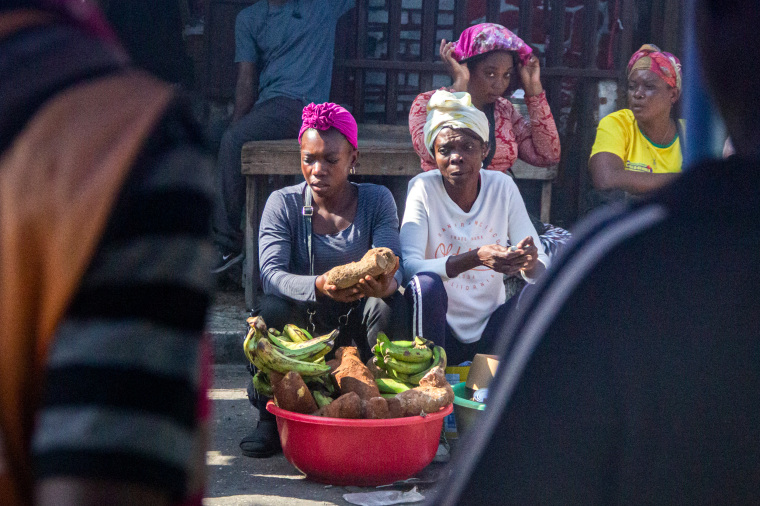
Eight areas were now assessed to be in an emergency phase — the worst level before famine, it said.
These include the Artibonite valley, Haiti’s farming heartland, which has been badly hit by gangs expanding from the capital Port-au-Prince, rural parts of the Grand-Anse peninsula and neighborhoods of the capital such as the poor Cite Soleil district.
The Caribbean country has been gripped by violence since rival gangs unleashed a wave of attacks this month, including raids on police stations and the international airport. The conflict has killed thousands and displaced hundreds of thousands.
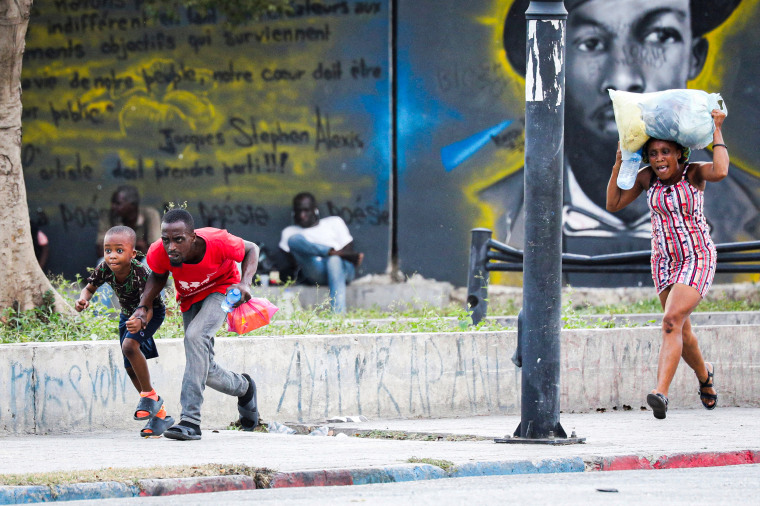
Regional leaders are trying to form a transitional council and Prime Minister Ariel Henry has promised to resign once it is set up. But he is currently stranded abroad, shut out of the country after making a visit to Kenya to discuss the deployment of an international security force. This has now been put on hold.
The FSB security service said ‘all four terrorists’ had been arrested while heading to the Ukrainian border, and that they had contacts in Ukraine.
The WFP said Haiti was now suffering its worst levels of food insecurity on record, with many people resorting to desperate measures and taking on more debt as armed groups take over farmlands and steal crops.
The IPC report found only 5% of Haitians had received humanitarian food aid and the WFP said that operations were “woefully under-funded.”
More than 30,000 people have fled violence and shortages in the capital in just two weeks this month, according to U.N. data, most of them people who had already lost their homes and were living in camps or with other families.
Authorities in the neighboring Dominican Republic, who have deported tens of thousands of Haitian migrants, have said they have not agreed to an air bridge announced by the U.N. to supply aid to Haiti, saying its air route is for evacuating foreigners.
Laurent Uwumuremyi, who heads aid group Mercy Corps’ Haiti arm, said gangs now control nearly 90% of the capital with basic errands impossible, key infrastructure closed, shortages in basic supplies and hospitals on the brink of collapse.
“Even in areas like Petion-Ville, an upscale neighborhood that until recently was considered safe, the population has been barricaded indoors,” he said. “If the situation deteriorates without any efforts to address the unfolding humanitarian crisis, Port-au-Prince will soon find itself completely overwhelmed.”
Port-au-Prince, Haiti — The U.S. Embassy in Haiti said Tuesday that it was closing down due to gunfire nearby, after months of ceaseless violence at the hands of gangs drove thousands of Haitians onto the streets to demand security.
“The Embassy is closed today. All personnel are restricted to Embassy compounds until further notice due to gunfire in the vicinity of the Embassy. Travel between the compounds is prohibited,” the embassy said in a statement posted to its official social media channels, adding that some routes to the secure compound could also be “impacted due to continued rapid gunfire.”
The embassy statement warned U.S. nationals in Port-au-Prince to avoid the area around the diplomatic compound completely, along with any “demonstrations and any large gatherings of people.”
The embassy was shuttered a day after several thousand people — their faces covered to conceal their identities — marched through Haiti’s capital demanding protection from the violent gangs which have pillaged neighborhoods across the capital city and beyond for months.
Haitians’ daily lives have been disrupted by incessant gang violence that has worsened poverty across the country as it awaits a decision from the U.N. Security Council over a potential deployment of an international armed force.
“We want security!” the crowd chanted as it marched for two hours Monday from the troubled community of Carrefour-Feuilles to Champ de Mars in the downtown area and then to the prime minister’s official residence, where police broke up the demonstration with tear gas.
RICHARD PIERRIN/AFP/Getty
“I can’t work. I can’t go out. I’m like a prisoner in my own home,” said Wilene Joseph, a 36-year-old street vendor and mother of two who joined the march out of frustration.
“I worry about my kids being shot because bullets are flying from all directions all the time,” Joseph said of her children, ages 5 and 7. “The situation is unacceptable.”
Since the assassination of President Jovenel Moïse in 2021, experts say gangs have seized control of up to 80% of Port-au-Prince, killing, raping and sowing terror in communities already suffering endemic poverty.
From January to March, more than 1,600 people have been reported killed, injured or kidnapped, a nearly 30% increase compared with the last three months of 2022, according to the newest U.N. report.
On Monday, UNICEF announced an “alarming spike” in kidnappings, with nearly 300 confirmed cases so far this year, almost equaling the number reported for all of last year, and almost three times the total for 2021.
The agency noted that women and children are increasingly being kidnapped and used for financial or tactical gain. Among those kidnapped in late July was Alix Dorsainvil, a U.S. nurse from New Hampshire, and her young daughter.
Dorsainvil works for El Roi Haiti, a Christian organization that offers medical care, education and other services. She and her daughter remain in the hands of their captors, who are demanding $1 million in ransom.
Parents of young children are particularly fearful that gangs will snatch them when they go to and from school. Nacheline Nore, 40, said her two boys, ages 10 and 8, have to call her every day as soon as they step inside their school, and she rides back home with them every afternoon: “You don’t know who’s going to be the next target,” she said.
Mario Jenty, a 36-year-old cell phone vendor who joined Monday’s march, said the increase in kidnappings is pushing Haitians into even deeper poverty. “They’re going to have to sell that home to pay for ransom, and there’s a chance they might not be released,” he said of the victims.
Jenty, who lives in Carrefour-Feuilles, said he would not allow gangs to take over his neighborhood. “I’m going to fight this,” he said. “I’d rather die than leave my community.”
Jenty joined the thousands of Haitians who yelled “Bwa kale!” on Monday as they marched, a reference to a violent uprising that began earlier this year, with civilians targeting suspected gang members. More than 200 people have been slain since then, and demonstrators vowed to keep the movement alive as gangs overwhelm Haiti’s understaffed and under resourced police department.
Last October, Haiti’s prime minister and other top-ranking officials requested the urgent deployment of an international armed force to help quell gang violence.
In late July, Kenya offered to lead a multinational police force, but the U.N. Security Council has yet to vote on a resolution to authorize a non-U.N. multinational mission. The U.S. said last week that it would put forward such a resolution.
Kidnappings of women, children spiking in Haiti where a U.S. nurse, daughter remain captive
Source link
As a kidnapped American nurse and her child marked their 11th day in captivity in Haiti on Monday, the United Nations’ leading child-welfare agency says it is seeing an alarming spike in the abductions of women and children in the Caribbean nation.
Nearly 300 cases have been reported in the first six months of this year, UNICEF said. The number is close to the total documented in 2022 and is close to three times more than what was recorded in 2021.
In Haiti, most kidnappings are at the hands of armed gangs, whose warfare has worsened since the 2021 assassination of the country’s president, Jovenel Moïse. Gangs routinely grab people and hold them for ransom. But sometimes abductions are the result of inside jobs, where victims are set up — and even taken — by people they know, including family members, friends or employees.
Still, the high number of women and children who are falling victim to the epidemic is worrisome, the U.N. agency said.
“We can’t say that they’re specifically targeting women and children, but indeed we see that there is an increased number of women and children, both boys and girls, who are being abducted,” Laurent Duvillier, UNICEF’s regional chief of communications and advocacy for Latin America and the Caribbean, said in an interview.
“That in itself is a concern, as far as UNICEF is concerned, because they require specific assistance,” he added. “The level of risk is higher for them in many ways and they have needs that are very specific.”
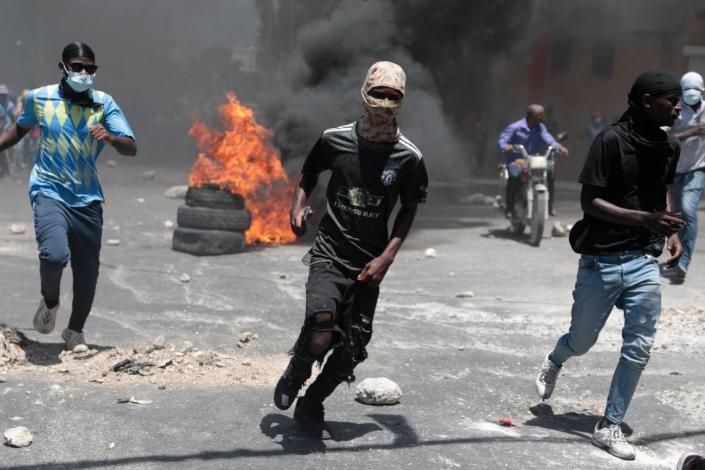
As Haitians took to the streets in Port-au-Prince on Monday to protest against the violence, UNICEF called for the immediate release and safe return of all those who have been kidnapped. The actual number of kidnappings remains unknown since many abductions go unreported for fear of retaliation by armed groups, or concerns about victims being held longer due to their perceived ability to pay large ransom demands.
Farhan Haq, deputy spokesman for U.N. Secretary-General António Guterres, speaking to reporters in New York on Monday, said “there are many different parties” responsible for the kidnappings in Haiti.
“There’s been a rise in activity, particularly by different criminal and other gangs. And that is why we’ve been pushing for a … multinational force that could help restore stability and order to Haiti,” Haq said.
Among those still being held by kidnappers is the former head of the country’s provisional electoral council and television station owner, Pierre-Louis Opont, who was abducted over a month ago, and Alix Dorsainvil. A U.S. citizen, Dorsainvil is a community health nurse from New Hampshire who works for the Christian humanitarian aid organization El Roi Haiti in Port-au-Prince. She and her daughter were abducted on the morning of July 27 on the campus of the nonprofit. She is married to the organization’s director, Sandro Dorsainvil.
A State Department spokesperson said that the U.S. government is aware of reports of the kidnapping of two U.S. citizens in Haiti.
“We are in regular contact with Haitian authorities and will continue to work with them and our U.S. government inter-agency partners,” the spokesperson said. “We have nothing further to share at this time.”
Dorsainvil was kidpoanoeod the same day the State Department ordered the departure of non-emergency personnel from its embassy, located several miles east in the suburb of Tabarre. Days earlier, dozens of Haitian families had sought refuge in front of the embassy after an armed gang invaded their nearby neighborhood.
U.S. citizens were also advised to immediately leave Haiti.
The State Department and El Roi have said little about the circumstances surrounding Dorsainvil’s abduction.
The Associated Press, citing witnesses at the campus, said Dorsainvil was providing medical care in El Roi’s small brick clinic Thursday morning when armed men burst in and grabbed her. The captors demanded $1 million in ransom.
Haitians familiar with the grassroots organization’s work have held protests demanding the duo’s release.
A report by the Center for Analysis and Research in Human Rights in Port-au-Prince, which tracks kidnappings, concurs with UNICEF that there is a significant rise in kidnappings in Haiti compared to previous year. Since January, there have been 539 cases reported, the human rights group said.
Kidnappings are a very “traumatic experience” for victims, said Duvillier, the UNICEF spokesman.
“Many things can happen during the captivity, unfortunately,” he said, citing cases of sexual violence against girls and women.
“It’s not always the case, but it can happen. So there are many risks involved,” Duvillier added. “We have experience of girls being held for months in captivity, living with the armed groups being threatened, different forms of violence….It varies from one person to another.”
Even after individuals are released the trauma persists, he said. Victims are sometimes scared to make contact with relatives either because they want to protect them from being abducted or they are ashamed of what happened to them while in captivity. As a result of the increase in needs for services, Duvillier said UNICEF has increased its efforts in Haiti, working with police and the brigade in charge of minors to provide support and in some cases even housing for freed victims.
”Those who have been abducted live with fear that it can happen again and they don’t feel safe to go back to their relatives because they don’t want to expose their relatives, so they don’t know where to go,” he said.
The escalation in kidnappings and armed violence have made the country’s humanitarian crisis worse. Today, an estimated 5.2 million people, almost half of the population, are in need of humanitarian assistance, the U.N. said. This includes 3 million children, many of whom have been displaced and are unable to go to school, while others are suffering from high rates of malnutrition.
In cases where they are forcefully taken by armed groups and used for financial or tactical gains, they are also left to grapple with deep physical and psychological scars, possibly for years.
“The stories we are hearing from UNICEF colleagues and partners on the ground are shocking and unacceptable,” said Gary Conille, UNICEF Regional Director for Latin America and the Caribbean. “Women and children are not commodities. They are not bargaining chips. And they must never be exposed to such unimaginable violence. The growing trend in kidnappings and abductions is extremely worrisome, threatening both the people of Haiti and those who have come to help.”
Still, protection for women and children, in general, are among the most underfunded areas, said Duvillier. A $720 million humanitarian aid plan for Haiti has only received 23% of the funds it has requested, the United Nations has said.
“We need to provide water, we need to provide shelter, we need to provide food to people. But beyond those humanitarian needs to keep people alive, child protection, for example, is an area that is absolutely critical. But you may not see the impact of it,” he said. “You may not see how tangible, how visibly important it is because most of the people are living with internal scars…. But it’s very important if we want them to rebuild their lives and to move forward, go beyond the trauma and give them a sense of a normal life.”
PORT-AU-PRINCE, Haiti (AP) — Several thousand people — their faces covered to conceal their identities — marched through Haiti’s capital on Monday demanding protection from violent gangs who are pillaging neighborhoods in the capital Port-au-Prince and beyond.
Haitians’ daily lives have been disrupted by incessant gang violence that has worsened poverty across the country as it awaits a decision from the U.N. Security Council over a potential deployment of an international armed force.
“We want security!” the crowd chanted as it marched for two hours from the troubled community of Carrefour-Feuilles to Champ de Mars in the downtown area and then to the prime minister’s official residence, where police broke up the demonstration with tear gas.
“I can’t work. I can’t go out. I’m like a prisoner in my own home,” said Wilene Joseph, a 36-year-old street vendor and mother of two who joined the march out of frustration.
“I worry about my kids being shot because bullets are flying from all directions all the time,” Joseph said of her children, ages 5 and 7. “The situation is unacceptable.”
Since the assassination of President Jovenel Moïse in 2021, experts say gangs have seized control of up to 80% of Port-au-Prince, killing, raping and sowing terror in communities already suffering endemic poverty.
From January to March, more than 1,600 people have been reported killed, injured or kidnapped, a nearly 30% increase compared with the last three months of 2022, according to the newest U.N. report.
On Monday, UNICEF announced an “alarming spike” in kidnappings, with nearly 300 confirmed cases so far this year, almost equaling the number reported for all of last year, and almost three times the total for 2021.
The agency noted that women and children are increasingly being kidnapped and used for financial or tactical gain. Among those kidnapped in late July was Alix Dorsainvil, a U.S. nurse from New Hampshire, and her young daughter. Dorsainvil works for El Roi Haiti, a Christian organization that offers medical care, education and other services. She and her daughter remain in the hands of their captors, who are demanding $1 million in ransom.
Parents of young children are particularly fearful that gangs will snatch them when they go to and from school. Nacheline Nore, 40, said her two boys, ages 10 and 8, have to call her every day as soon as they step inside their school, and she rides back home with them every afternoon: “You don’t know who’s going to be the next target,” she said.
Mario Jenty, a 36-year-old cell phone vendor who joined Monday’s march, said the increase in kidnappings is pushing Haitians into even deeper poverty. “They’re going to have to sell that home to pay for ransom, and there’s a chance they might not be released,” he said of the victims.
Jenty, who lives in Carrefour-Feuilles, said he would not allow gangs to take over his neighborhood. “I’m going to fight this,” he said. “I’d rather die than leave my community.”
Jenty joined the thousands of Haitians who yelled “Bwa kale!” on Monday as they marched, a reference to a violent uprising that began earlier this year, with civilians targeting suspected gang members. More than 200 people have been slain since then, and demonstrators vowed to keep the movement alive as gangs overwhelm Haiti’s understaffed and under resourced police department.
Last October, Haiti’s prime minister and other top-ranking officials requested the urgent deployment of an international armed force to help quell gang violence.
In late July, Kenya offered to lead a multinational police force, but the U.N. Security Council has yet to vote on a resolution to authorize a non-U.N. multinational mission. The U.S. said last week that it would put forward such a resolution.
___
Associated Press writer Dánica Coto in San Juan, Puerto Rico contributed.